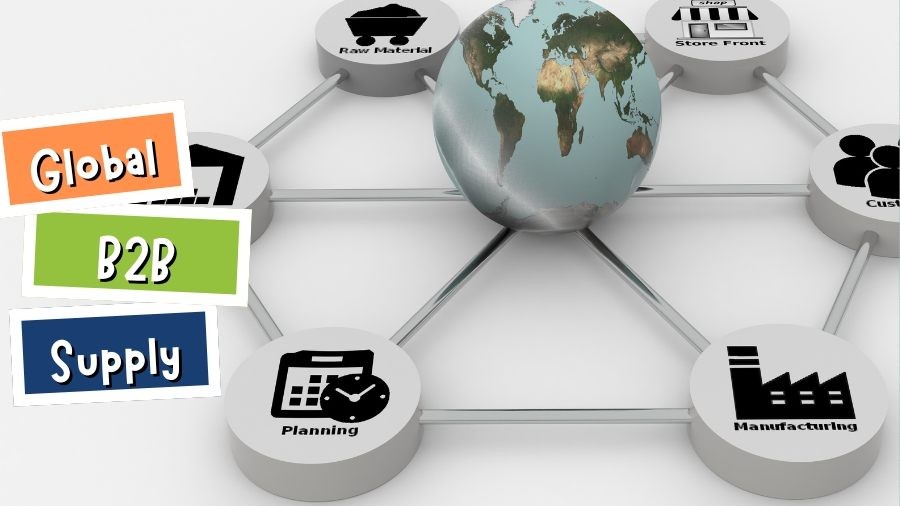Global Supply Chain Challenges and Solutions for B2B Businesses

Global supply chains are facing unprecedented challenges, with businesses across industries grappling with delays, shortages, and disruptions that have far-reaching impacts. From manufacturing delays to difficulties in securing raw materials, the consequences of these disruptions ripple throughout the business world. Companies that fail to address these challenges could see significant setbacks, making it crucial to find effective strategies for overcoming them.
The B2B sector, which relies heavily on complex and often international supply chains, is particularly vulnerable. Supply chain inefficiencies not only disrupt production but also damage supplier relationships and reduce customer satisfaction. To maintain a competitive edge, businesses need to understand how these challenges affect their operations and what steps can be taken to mitigate the risks.
A recently published article offers a comprehensive look into the key challenges that B2B businesses face in today's global supply chain environment. More importantly, it provides actionable insights into how companies can address these issues and safeguard their operations against future disruptions.
One of the most pressing issues is the ongoing disruption in logistics and transportation. Global shipping bottlenecks, exacerbated by the COVID-19 pandemic, have caused significant delays
Another major challenge is the shortage of raw materials. Global events, including geopolitical tensions and environmental crises, have led to disruptions in the supply of essential materials. As a result, businesses are facing increased costs and longer lead times, which can severely impact production and order fulfillment. Without access to key materials, manufacturers cannot meet customer demand, leading to lost revenue and potentially strained relationships with clients.
Market volatility adds another layer of complexity to the global supply chain. Fluctuating prices for raw materials, energy, and transportation can wreak havoc on a company’s budget and planning efforts. Businesses are finding it increasingly difficult to forecast for the future when external factors, such as political instability or environmental changes, can have sudden and dramatic effects on their operations.
While these challenges are formidable, businesses have options for reducing their impact. One of the primary solutions discussed is the use of technology to enhance supply chain visibility and efficiency. Data analytics and artificial intelligence (AI) can help businesses forecast demand, manage inventory, and identify potential disruptions before they occur. By adopting these tools, companies can react more quickly to changes in the market and reduce the risks associated with supply chain disruptions.
The article also emphasizes the importance of diversifying supplier networks. Relying too heavily on a single supplier or region for key materials can leave businesses vulnerable to unexpected disruptions. By expanding their supplier base and sourcing materials from different regions, companies can reduce their exposure to risks and maintain more stable production levels. This strategy also involves building stronger relationships with suppliers, as transparency and communication become critical in times of uncertainty.
Improving risk management is another key takeaway from the article. Many businesses have been forced to reevaluate their risk management strategies in light of recent supply chain disruptions. This includes identifying potential weaknesses in their supply chains, such as a lack of alternative suppliers or insufficient inventory levels. By proactively addressing these vulnerabilities, businesses can build more resilient supply chains that are better equipped to handle unforeseen disruptions.
Collaboration is essential for overcoming supply chain challenges. This means fostering stronger relationships between businesses, suppliers, and other key stakeholders. Open communication and transparency help ensure that all parties are aware of potential disruptions and can work together to find solutions. Collaboration also extends to customers, as keeping clients informed about potential delays or disruptions can help maintain trust and prevent dissatisfaction.
The article suggests that businesses look beyond short-term fixes and focus on long-term strategies for supply chain management. While addressing immediate challenges is important, companies that invest in long-term solutions, such as automation and digital transformation, will be better positioned to handle future disruptions. These technologies can help improve operations, reduce costs, and enhance overall efficiency.
For businesses looking to gain deeper insights into these supply chain challenges and the strategies available to overcome them, the full article offers comprehensive guidance. Click here to explore the detailed solutions and expert perspectives: https://blog.b2bmap.com/understanding-and-overcoming-the-challenges-in-global-b2b-supply-chain.
Understanding how to tackle global supply chain disruptions is critical for any B2B business that wants to remain competitive in today’s market. The insights shared in this article provide valuable tools and strategies that can be applied to real-world situations, helping businesses not only overcome current challenges but also prepare for future ones.
By focusing on collaboration, technology adoption, and proactive risk management, businesses can create more resilient supply chains that are less vulnerable to external shocks. The article’s detailed analysis of the factors contributing to supply chain disruptions, combined with its practical recommendations for addressing these challenges, makes it an essential read for anyone involved in supply chain management.
For businesses looking to strengthen their supply chains and reduce the risks associated with global disruptions, this article provides a wealth of valuable information. From adopting new technologies to diversifying supplier networks, the strategies outlined can help safeguard operations and ensure business continuity.
To explore more detailed insights and practical solutions for overcoming global supply chain challenges, click the link to read the full article: https://blog.b2bmap.com/understanding-and-overcoming-the-challenges-in-global-b2b-supply-chain.
